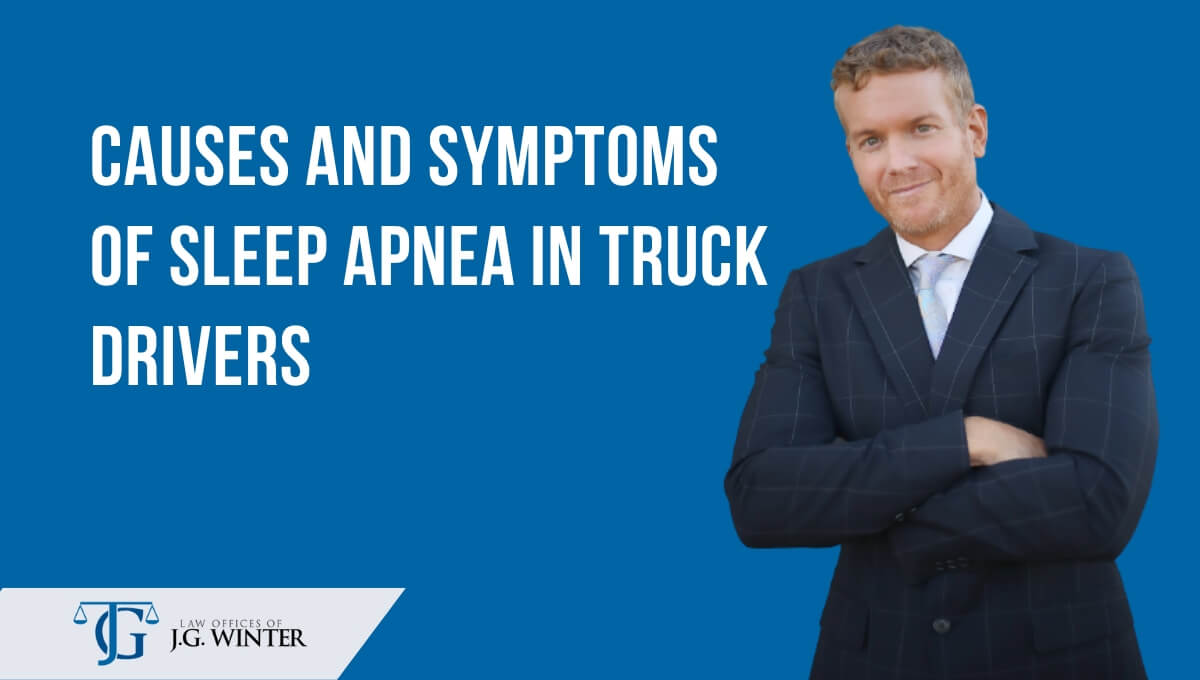The trucking industry serves a vital role in the transportation network, ensuring the delivery of goods across the country. However, sleep apnea constantly threatens the safety of truck drivers and the general public.
This condition, defined as interrupted breathing during sleep, has the potential to lead to drowsy driving and an increased risk of accidents involving commercial vehicles. Federal Motor Carrier Safety Administration (FMCSA) reports that 28% of commercial truck drivers have mild to severe sleep apnea.
What is sleep apnea?
Sleep apnea is a potential sleep disorder in which breathing repeatedly stops and starts. It commonly affects truck drivers due to their prolonged awake hours.
Sleep apnea is divided into 3 types. These are central sleep apnea, obstructive sleep apnea, and complex sleep apnea syndrome. Among the three, obstructive sleep apnea is the most common. The narrow airways cause sleep apnea, which could occur for many reasons and lead to various accidents.
What causes sleep apnea in truck drivers?
Sleep apnea occurs when the muscles in the back of your throat become too relaxed. These muscles support the soft palate, the triangular piece of tissue called the uvula, the tonsils, the sides of your throat, and the tongue.
When these muscles relax, your airways narrow and may even close as you breathe. Narrow airways make it difficult to get enough air, which can reduce the oxygen levels in your blood. Sleep apnea affects your alertness, potentially leading to accidents.
The chances of sleep apnea increases due to the following factors :
- Excess weight
- Neck circumference
- Age
- Family history
- Smoking
- Nasal congestion
What are the symptoms of sleep apnea in truck drivers?
The signs and symptoms of sleep apnea vary from person to person. The most common symptom is snoring. The other symptoms of sleep apnea are:
- High blood pressure
- Diabetes
- Attention problem
- Poor memory
- Morning headache
Driving a truck with sleep apnea

Truck drivers with sleep apnea can drive but must adhere to strict regulations. The Federal Motor Carrier Administration has set strict rules for truck drivers with sleep apnea. According to the law, the Department of Transportation (DOT) must conduct a thorough medical examination on them. Truckers with sleep apnea lose their ability to restore sleep and remain vigilant behind the wheel, leading to many accidents every year.
CPAP machine compliance as per DOT and treatment
A Continuous Positive Airway Pressure (CPAP) machine helps a person with obstructive sleep apnea breathe more easily during sleep.
Drivers suffering from sleep apnea must wear their machine for at least 4 hours or more per night while sleeping. The CPAP machine records various specific results collected throughout the night. The doctor reviews the recorded data and sends a letter to the DOT physician stating the ability to drive. The DOT issues a certificate upon the provided note.
How does sleep apnea cause truck accidents?
According to the Federal Motor Carrier Safety Administration (FMCSA), sleep apnea impairs drivers’ daytime alertness and performance. While drivers may not fall asleep behind the wheel, they may exhibit reduced attentiveness and slower reaction times to collision risks.
Truck drivers with sleep apnea often receive small bouts of sleep each night. They never get deep sleep, which is essential for physical, emotional, and mental rest. Lack of sleep results in the driver having poor memory, reduced attention, and increased irritability, which leads to accidents.
How to determine liability in a truck accident caused by sleep apnea?

Proving a truck driver’s liability in a sleep apnea-related accident can be complex. Still, you must seek guidance from an experienced truck accident lawyer. If you are involved in such an accident, you should gather evidence to strengthen your case.
Your immediate priority after being involved in an accident caused by a sleep apnea driver should be as follows:
- Seek necessary medical attention: Obtain essential diagnoses and treatment, keeping records of receipts, medical bills, and expenses to support your medical compensation claim.
- If the driver was on CPAP treatment, provide their medical records to support your injury claim. Examine the driver’s logbook to ensure compliance with regulations on maximum driving hours, which you can verify through data from Electronic Logging Devices (ELDs) like EROAD, Keeptruckin, Transflo, and others.
- Gather evidence and documents: Gather documents, such as CCTV footage of the accident (if available), the police report, eyewitness statements, etc., to strengthen your case.
- Obtain a comprehensive evaluation of damages: Consult medical, legal, and psychological experts to assess the extent of your injuries, which may include:
- Medical expenses and treatment costs
- Loss of income
- Non-financial damages
- Punitive damages
- Disability damage
If you have strong evidence, it will help you get the compensation more quickly. You can contact us at JG Winter Law if you encounter such cases. Our expert Sacramento truck accident lawyer will provide you with support and guidance throughout the case.
Frequently Asked Questions (FAQs)
Do truck drivers get sleep apnea?
According to the Federal Motor Carrier Safety Administration, 28% of truck drivers have sleep apnea.
Who determines if a truck driver has sleep apnea?
A healthcare professional, often a physician, typically conducts a medical evaluation to determine whether a truck driver has sleep apnea.
What is sleep apnea in driving?
Sleep apnea while driving is when a driver experiences interruptions in their breathing during sleep. This can result in excessive daytime sleepiness and impaired alertness while operating a vehicle, potentially increasing the risk of accidents.
If you have sleep apnea, can you still be a truck driver?
Yes, you can be a truck driver if you have sleep apnea. Still, you must adhere to strict Federal Motor Carrier Safety Administration (FMCSA) rules.
How does sleep apnea affect my ability to be a truck driver?
Sleep apnea can impact your ability to work as a truck driver by potentially causing excessive daytime sleepiness, reducing alertness, and increasing the risk of accidents.


